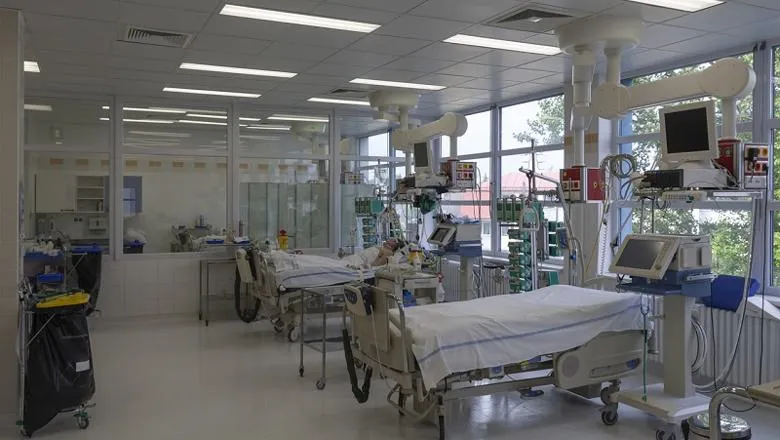Many questions have been asked about the chance of contracting COVID-19 whilst in hospital, and this is the first largely UK study to estimate the proportion of hospitalised COVID-19 patients who acquire the infection whilst already there.
Lead author Dr Ben Carter from the Institute of Psychiatry, Psychology & Neuroscience (IoPPN) King’s College London
25 August 2020
First UK estimate of the number of COVID-19 patients infected, whilst in hospital
A new study led by King’s College London has estimated that at least one eighth of COVID-19 hospital patients contracted the virus whilst already in hospital, and they had a better outcome than similar patients those who were infected in the community.

Published in the Journal of Hospital Infection, the study analysed data on 1,564 COVID-19 patients who were admitted up until 28 April to 10 hospital sites in the UK and one in Italy.
The study estimated that at least 12.5 % of all COVID-19 inpatients had a hospital acquired (nosocomial) infection. The researchers highlight that the group that became infected whilst in hospital were older, more frail and more likely to have pre-existing health conditions compared to the group who were admitted to hospital for COVID-19 infection.
The analysis compared the outcomes of COVID-19 patients that were infected in the community to those who acquired the infection whilst in hospital and showed that, when accounting for age, existing health conditions and severity of infection, those who acquired COVID-19 whilst in hospital were less likely to die than equivalent patients infected in the community .
Since the COVID-19 outbreak there has been a significant reduction in the number of people going into hospital for reasons other than COVID-19 infection. In March 2020 there has been 29% fewer Emergency Department attendances reported in England alone compared to March 2019.
Now that the pandemic has eased there is concern that people who require non-COVID-19 medical care are not going to hospital due to concern around contracting the virus. There is a need for information on the patients who acquire COVID-19 in hospital and their risk of mortality, compared to those who acquire COVID-19 infection in the community.
Dr Ben Carter continued: ‘We want to highlight that the majority of these patients had already been in hospital for a long time, they were older, frailer and had pre-existing health conditions, than patients infected in the community.’
The researchers suggest that the reason behind the better outcomes for patients already in hospital could be due to faster diagnosis and timely clinical management, as they were in a clinical setting from the outset and therefore monitored closely.
With daily inpatient assessment of those already in hospital it is likely that there was prompt recognition of COVID-19 like symptoms and diagnosis of COVID-19 infection. In contrast those patients who became infected in the community would have declined as the disease progressed and may even have tolerated their symptoms at home for a period of time before requiring hospital admission.
Senior-author and consultant geriatrician Dr Jonathan Hewitt from Cardiff Universit
Dr Jonathan Hewitt continued: 'This difference in clinical management may have led to the patients already in hospital to have timely supportive treatment, as opposed to those coming from home who may have presented late with more severe illness.'
Nocosomial patients are those who become infected whilst already in hospital. The study defined nocosomial patients as those who were diagnosed 15 or more days after admission to hospital (12.5% of patients). Patients with a diagnosis date less than 5 days after admission were likely to be community acquired (76.7 % of patients). Those with a positive diagnosis between five and 14 days after admission could be in either group but for this study were included in the community acquired infection group (10.8% of patients).
Dr Carter added: ‘We believe the study has important implications for messaging around hospital attendance for non-COVID related reasons and could potentially inform policy decisions and modelling in this area. These findings indicate that for those who become infected whilst in hospital, timely management could improve their recovery compared to those who become infected in the community. The study wasn’t able to analyse those who may have acquired COVID-19 infections in hospital and then gone back to the community but we hope that by providing this first estimate it will encourage more research in this area.’
The proportion of nosocomial infections with COVID-19 found within this study was lower than the 41% previously reported in a study by Wang and colleagues in China. However direct comparisons are difficult, and the study conducted by Wang had a small sample size (total 138 patients) which included healthcare worker infections.
The research was a collaboration between Cardiff University, North Bristol NHS trust, King’s College London, Aberdeen and Glasgow universities and the University of Modena and Reggio Emilia, and included patients from Cardiff and Vale University Health Board, Aneurin Bevan University Health Board, North Bristol NHS Trust, Salford Royal NHS Foundation Trust, NHS Greater Glasgow and Clyde, NHS Grampian and the University Hospital of Modena Policlinico.
Reference: Carter et al. (2020) Nosocomial COVID-19 infection: examining the risk of mortality. The COPE-Nosocomial study (COVID in Older PEople). Journal of Hospital Infection. DOI: 10.1016/j.jhin.2020.07.013
Contact:
Franca Davenport, Interim Senior Press Officer, IoPPN: franca.davenport@kcl.ac.uk +44 7718 697176
